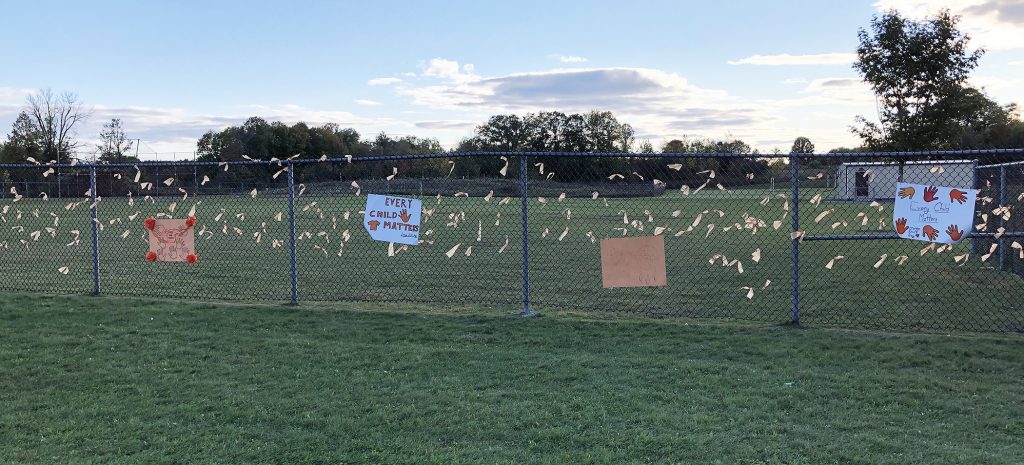WC reflects on new Indigenous holiday
By Jake Davies - West Carleton Online
WEST CARLETON – Many of West Carleton’s organizations and businesses are taking time out to reflect on the meaning behind Canada’s first National Day for Truth and Reconciliation celebrated today (Sept. 30).
The day honours the lost children and survivors of residential schools, their families and communities.
“Public commemoration of the tragic and painful history and ongoing impacts of residential schools is a vital component of the reconciliation process,” the Government of Canada released in a statement.
The creation of this federal statutory holiday was through legislative amendments made by Parliament. On June 3, Bill C-5, An Act to amend the Bills of Exchange Act, the Interpretation Act and the Canada Labour Code (National Day for Truth and Reconciliation) received Royal Assent.
“Our mill is closed today to honour the first ever National Day for Truth and Reconciliation,” Ottawa Valley Grain Products owner Kevin Stewart released in a statement today. “This is not just a day off. It is a day to learn, educate, support and honour Indigenous people and children. It is a day to acknowledge the impacts of residential schools and remember the children that didn’t make it home. Every child matters.”
All West Carleton schools also marked the important day with a variety of different programming throughout the day, unique to each school.

“Stonecrest Elementary School recognized the important day with a variety of activities including stories, video presentations, art work all with a focus on learning about and remembering the tragedy of the history of the residential school for indigenous people in Canada,” teacher Kate Tucker told West Carleton Online. “All Stonecrest students participated in creating a memorial for the day by adding an orange ribbons to the fence at the students’ main entrance to the yard.”
Environmental activists the Friends of the Carp River (FCR) also discussed the day and the issue the river the volunteers protect and enhance, is on unceded territory.
“We respectfully acknowledge the waters of the Carp River and its tributaries, our homes and our businesses are on the traditional and unceded territory of the Algonquin Anishinaabeg people, who have cared for this land since the beginning,” the FCR released in a statement today. “We offer our gratitude to the First Nations for their care of the land and for teachings about our natural world. As we move forward together along the path of reconciliation, may we learn and honour those teachings and bring them into the work that we do.”
Sister organization the Friends of the Carp Hills (FCH) are in a similar position.
“On this inaugural National Day for Truth and Reconciliation, we first acknowledge the Carp Hills, the Carp River, our community, and our homes are on the traditional and unceded territory of the Algonquin Anishinaabeg people, who have lived in harmony with and cared for this land for thousands of years,” the FCH board of directors released in a statement today. “In a spirit of partnership and reconciliation, let us be open to the knowledge and wisdom of First Nations people. One important belief is that when we make decisions today, we must consider their impact seven generations from now. Let us hold this principle of seven generations in our hearts and keep it in our minds as we continue to act as stewards of the Carp Hills, looking beyond ourselves and our material wants to how we live with the natural world in a sustainable and harmonious way. While accepting the errors of our ways in the past, let us look forward together to the opportunities for listening, learning, and collaborating in the future. We have much good work to do.”
A West Carleton business relying heavily on the land it occupies made sure to recognize the importance of the day as well.
It’s not a political statement that is being made, it’s a human one,” owner Maureen McBride and her daughter general manager Tricia McBride released in a statement today. “This is a Canadian statement. We recognize and we are grateful to have the ability to enjoy the unceded Algonquin territory that the course is on. So many have the opportunity to enjoy, and we are thankful. On this official day of Truth and Reconciliation, we pause, reflect, remember, celebrate and heal.”
Canada’s Cold War Museum, the Diefenbunker, staff and executive also marked the important milestone holiday.
“The Diefenbunker was built on unceded Algonquin Anishinaabe territory,” the board released in a statement today. “Today, the Diefenbunker Museum board of directors, staff, and volunteers commemorate the first National Day for Truth and Reconciliation as a day of reflection and learning. We recognize the tragic history and ongoing legacy of residential schools, and respectfully honour Indigenous victims and survivors, their families, and communities. While the museum remains open to visitors today, we choose to remember and learn from our past to help build our collective future.”
The Mississippi Valley Conservation Authority (MVCA) also released a statement as the entire Mississippi Watershed is also on unceded Algonquin territory.
“We offer our gratitude to the first peoples for their care for and teachings about our earth and our relations,” MVCA board chair Jeff Atkinson said. “As we move together along the path of reconciliation, may we relearn and once again honour those teachings and bring them into the work that we do here.”
The importance of this monumental day is not lost on West Carleton’s youth either. The Huntley Curling Club’s competitive U15 girls’ team, Team LIKE, also discussed the holiday.
“Today is Canada’s first National Day for Truth and Reconciliation,” Team LIKE released in a statement. “We are honouring the survivors of residential schools, their families and communities, and we remember the children who never came home. We will take today as an opportunity to learn about, commemorate and reflect on the legacy of colonization and the importance of reconciliation as part of healing and creating a better country.”











